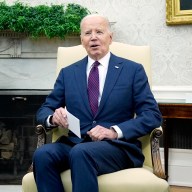The weekend strike by Toronto Transit Commission workers has nudged Mayor David Miller and TTC chair Adam Giambrone closer to the view that the TTC should be declared an essential service.
While neither supports the idea unequivocally, both said the brief but sudden strike changed their positions.
“From that perspective I’ve changed my view a little bit because of the events of the weekend,” Miller said yesterday.
If the city asked and the province agreed to label the TTC an essential service, the right of its employees to strike would be curtailed or eliminated and an arbitrator called in if bargaining reached an impasse.
Such legislation “would be precedent-setting,” according to Toronto lawyer Marvin Huberman, a civil litigator with expertise in transportation cases. In fact, the federal human resources department isn’t aware of any Canadian transit system so designated, according to spokesperson Murray Gross.
Huberman said declaring the TTC an essential service could also be contested in court by the union.
“Although I can clearly see the public policy rationale behind doing so,” he said, “the question really is, ‘Does this fall within the established principles of the essential-services matrix?’”
Ontario has no defined criteria for what’s considered an essential service. Police, firefighters and hospital workers are the three categories designated so far. In each case, separate legislation was required.
As for Crown employees and ambulance workers, before a strike or lockout begins, an “essential services agreement” must be in place, stipulating that a minimum number of employees remain on the job.
Miller has been reluctant to support the designation because it can lead to more expensive settlements.












